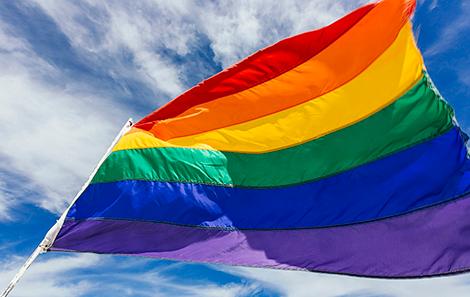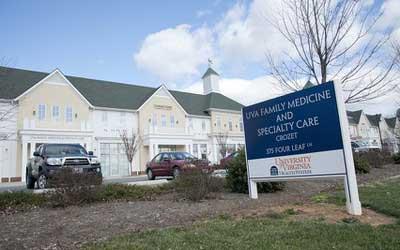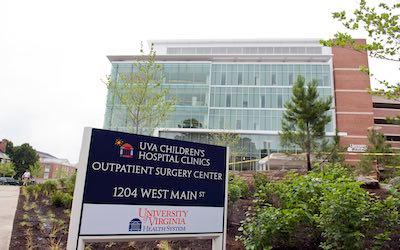LGBTQ+ Healthcare Services
If you’re lesbian, gay, bisexual, transgender, gender-nonbinary or queer, odds are, you've faced barriers to healthcare. Studies show that most LGBTQ+ people have. Discrimination includes denial of service, harassment, and bias in healthcare settings. Many healthcare professionals lack information about the healthcare needs of LGBTQ+ patients.
Like others, you may have chosen to stay silent. You've hidden your sexual orientation or gender identity when visiting the doctor. Or, like many people in the LGBTQ+ community, you haven’t seen a doctor at all.
UVA Health's Commitment to LGBTQ+-Affirming Care
At UVA Health, you'll find providers committed to providing LGBTQ+-affirming health services to our patients. We know getting the care you need can be stressful. We aim to help by creating a safe and welcoming environment for all of our patients.
Our services include:
Learn more about our support services and resources.
LGBTQ+ Healthcare at UVA Health
At UVA Health, we want you to find a welcoming, safe, and inclusive environment. We have providers with years of experience serving the LGBTQ+ community. We provide trainings to guide team members in living our commitment to inclusion.
We emphasize compassionate care for your whole person and offer:
- Primary and family medicine
- LGB-specific health screenings
- Reproductive and sexual health support
- Transgender healthcare services
- Information and resources
- Specialty referrals
- Financial screenings
- Patient education
Our organizational values put patients at the center of everything we do. We aspire to create a compassionate, inclusive environment for all.
Anti-Discrimination at UVA Health
UVA Health strongly supports the LGBTQ+ community and continues to provide gender-affirming care, services, and support for patients going through gender transition. UVA Health doesn't discriminate, exclude, or treat differently patients or visitors based on their race, age, color, national origin, religion, disability, sexual orientation, gender, gender identity, or gender expression.
UVA Health is a community of healing, compassion, inclusion, and respect for all. Discrimination and prejudice have no place here. See our non-discrimination policy.
Charley's Gender-Confirmation Surgery
From a young age, Charley Burton knew that his body did not match his gender identity – a struggle he kept inside for 50 years. With the help of family nurse practitioner Reagan Thompson, FNP, MSN, RN, and a whole team of caring providers, Charley found a safe place to become his true self.
CHARLEY BURTON: I'm Charley Burton. I'm a native of Charlottesville, Virginia. There's a picture of me as a little kid, and you can't tell that I wasn't a little boy.
I always knew. My body just didn't match my mind. And I pushed that in for the next 30, 40 years until I became 50 years of age and started my journey.
REAGAN THOMPSON: When I first met Charley, he was pretty frustrated. He had hit a lot of barriers getting appropriate transgender care and had given up on our system.
CHARLEY BURTON: And so when I go to the hospital, there's this level of anxiety that builds up in me every time. But I've been lucky because I've had a Reagan Thompson in my corner. She truly wants to know, what can she do as a medical professional to make my life better?
REAGAN THOMPSON: I think it's super important to listen to your patients and try to figure out what they're angry at.
CHARLEY BURTON: She has seen me at my lowest. And she now sees me where I'm at today.
[MUSIC PLAYING]
CHARLEY BURTON: Today's the day that I have my top surgery. Top surgery is the removal of the breasts. It's another stage in my transition. So I'm a little nervous today. Nervous and excited.
[MUSIC PLAYING]
JT STRANIX, MD: It's impossible not to like Charley when you meet him. We talk about what the goals are for surgery. His, in particular, were to have a chest that was congruent with his male identity.
SPEAKER 1: And can you tell me what Dr. Stranix is going to do? And Dr. Sopata?
CHARLEY BURTON: Yeah, we're doing a double mastectomy.
SPEAKER 1: OK.
CHARLEY BURTON: The top surgery.
SPEAKER 1: Yup.
CHARLEY BURTON: And total hysterectomy.
CARRIE SOPATA, MD: Trans patients should feel comfortable coming to any location in UVA and knowing that they're going to get the right care and the best care.
[MUSIC PLAYING]
CHARLEY BURTON: There was this one nurse. One night, she came in and she just wanted to know so the next person that comes on her floor that has had top surgery or is trans, what could she do better? And she asked some of the most beautiful, poignant questions. It was just total respect.
[MUSIC PLAYING]
JT STRANIX, MD: In my mind, a successful gender-affirming surgery is one that makes a patient feel more comfortable with their gender identity and really improves their overall well-being.
CHARLEY BURTON: The first day that I was able to take the ACE bandages off, I saw the chest that I've always wanted and it was-- I'm getting emotional now. It was just 10 times more than what I thought it would be.
REAGAN THOMPSON: And now Charley is a very happy person with very few complaints, and has a desire to fix a system that is driving him to be more involved in the transgender community.
[MUSIC PLAYING]
CHARLEY BURTON: I'm becoming the man that I want to be. I am confident in who I am, and I never thought I'd ever be there.
[MUSIC PLAYING]

A Leader in LGBTQ+ Healthcare Equality
UVA Health earned the “LGBTQ Healthcare Equality Leader” designation for scoring 100 points on the Human Rights Campaign's Healthcare Equality Index.

